Contact lenses
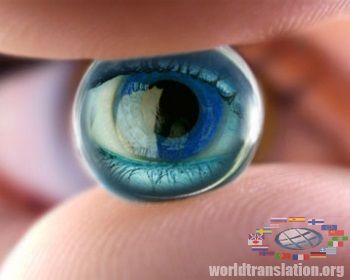
If you decide to wear contact lenses, you should learn how to care for them. Only the right care and the systematic replacement of lenses guarantee eye health. The main need is the choice of contact lenses by specialist.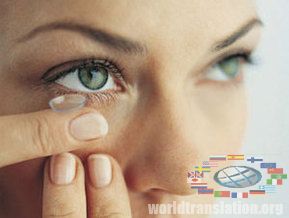 There are a lot of types of lenses, and their choice is determined by many factors, including age, lack of vision and way of life, because only a professional after an appropriate survey can offer you the most suitable model.
There are a lot of types of lenses, and their choice is determined by many factors, including age, lack of vision and way of life, because only a professional after an appropriate survey can offer you the most suitable model.
There are two types of contact lenses:
- ones, which you need to take off for the night;
- ones, in which you can sleep.
Contact lenses for a day, ie such, which must be removed before going to sleep.
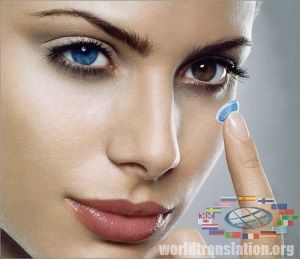 After a specified time, during which you can wear lenses, they must be thrown away and replaced with new ones. If their are not replaced in time, appear complications. There are many models of lenses. One you need to throw away after their removal, other can be worn for one, two or more weeks. Reusable contact lenses require cleaning and disinfection. For this reason, one-day models are more popular.
After a specified time, during which you can wear lenses, they must be thrown away and replaced with new ones. If their are not replaced in time, appear complications. There are many models of lenses. One you need to throw away after their removal, other can be worn for one, two or more weeks. Reusable contact lenses require cleaning and disinfection. For this reason, one-day models are more popular. 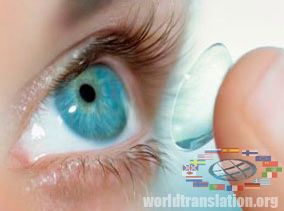 They do not need to be cleaned from sediments which accumulate during the day. Thus, the one-day lens model - is a healthy and convenient choice. Other lenses must be removed for the night, because sleeping with them can lead to restriction of the flow of oxygen, and therefore, for the eyes it will be more difficult to overcome any occurring infections.
They do not need to be cleaned from sediments which accumulate during the day. Thus, the one-day lens model - is a healthy and convenient choice. Other lenses must be removed for the night, because sleeping with them can lead to restriction of the flow of oxygen, and therefore, for the eyes it will be more difficult to overcome any occurring infections.
Contact lenses for extended wear, which are not removed for the night without need.
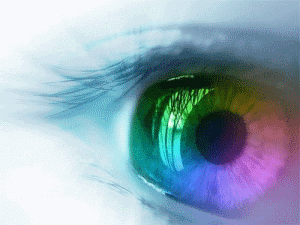 How long you can wear them, decides specialist. And some models should be utilized, the other after disinfection can be worn again. Replacement of lenses for new is an absolute necessity. Therefore, you should abide by the terms, which are recommended by a specialist,
How long you can wear them, decides specialist. And some models should be utilized, the other after disinfection can be worn again. Replacement of lenses for new is an absolute necessity. Therefore, you should abide by the terms, which are recommended by a specialist,  even if you do not notice deterioration of vision. Replacement is required in order to save eye health.
even if you do not notice deterioration of vision. Replacement is required in order to save eye health.
To save eye health, you need to observe some important rules. In addition to those rules, about which expert will tell, you should keep in mind the following:
- before contact with lenses, you should remember about hand washing, otherwise the dirt (bacteria and microorganisms) from the hands will go to the lens;
- use antibacterial soap for hand washing, it keeps purity longer;
- wiping your hands, use a towel which does not leave the dust on the hands. Otherwise, it will stick to the lens, which again would have to be cleaned and disinfected.
Liquid for lens care.
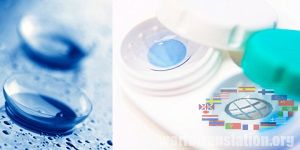 Not every liquid is suitable for this type of lens, and this is worth knowing. Its best to use that liquid, which specialist recommends you. Necessarily check the requirements to be sure that the liquid is suitable for your model of lenses. It is best to use multifunctional liquids, because using them you can clean, sanitize and wash lenses.
Not every liquid is suitable for this type of lens, and this is worth knowing. Its best to use that liquid, which specialist recommends you. Necessarily check the requirements to be sure that the liquid is suitable for your model of lenses. It is best to use multifunctional liquids, because using them you can clean, sanitize and wash lenses.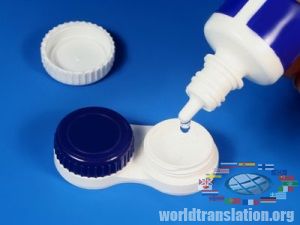 You should handle carefully both with lenses and liquid. Do not touch the end of the bottle, to avoid transmission of bacteria and microbes. When using liquid, bottle should be tightly closed. Its very important to comply with period of validity of the liquid and, as was already mentioned above, the destination for specific models of lenses.
You should handle carefully both with lenses and liquid. Do not touch the end of the bottle, to avoid transmission of bacteria and microbes. When using liquid, bottle should be tightly closed. Its very important to comply with period of validity of the liquid and, as was already mentioned above, the destination for specific models of lenses.
Cleaning of the lens.
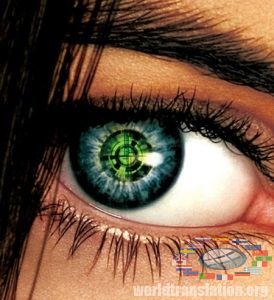 Those lenses which can be worn multiple times, require cleaning and disinfection. In such a way, you are removing from them more than 90% of bacteria. Soft lenses its better to clean immediately after you will take them off. Apply a few drops of liquid and clean the lens gently, wiping the front and rear sides. Then rinse them with liquid and put to the container for the lenses. They need to be immersed in the liquid for the time, which is specified on the label. Here it should be noted, that container must be in good and clean condition, because it can lead to contamination of the lens. After removal of the lens, you need to pour out the liquid, and dry the container to ensure, that bacteria and micro-organisms had no opportunity to development. Its recommended to change the container for lens once a month.
Those lenses which can be worn multiple times, require cleaning and disinfection. In such a way, you are removing from them more than 90% of bacteria. Soft lenses its better to clean immediately after you will take them off. Apply a few drops of liquid and clean the lens gently, wiping the front and rear sides. Then rinse them with liquid and put to the container for the lenses. They need to be immersed in the liquid for the time, which is specified on the label. Here it should be noted, that container must be in good and clean condition, because it can lead to contamination of the lens. After removal of the lens, you need to pour out the liquid, and dry the container to ensure, that bacteria and micro-organisms had no opportunity to development. Its recommended to change the container for lens once a month.
Visits to the doctor.
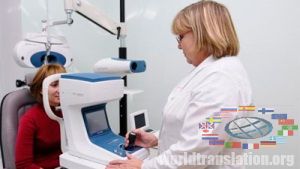 Visit to the doctor is necessary for healthy eyes and the whole body. Many eye diseases are asymptomatic, so you should regularly check your vision. When you visit the ophthalmologist, he can detect another diseases, such as: diabetes or high blood pressure.
Visit to the doctor is necessary for healthy eyes and the whole body. Many eye diseases are asymptomatic, so you should regularly check your vision. When you visit the ophthalmologist, he can detect another diseases, such as: diabetes or high blood pressure.